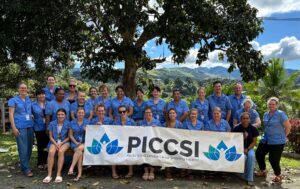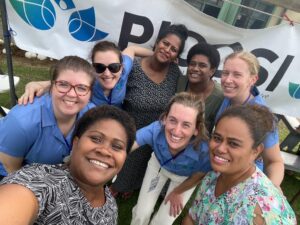The post Fiji fights cervical cancer with the help of Australian pathology volunteers first appeared on Know Pathology Know Healthcare.
]]>PICCSI employs self-collected human papillomavirus (HPV) testing for Fijian women, to rapidly detect the virus that causes the majority of cervical cancers via point-of-care PCR testing.
Test results are returned within 45 minutes, showing whether a patient is HPV positive for a high-risk type of HPV. For those who test positive and require treatment, this can be provided on the same day.
The treatment removes pre-cancerous cells and is administered by the skilled Australian volunteer team, spearheaded by Melbourne-based obstetrician gynaecologist Dr Nicola Fitzgerald.
Dr Fitzgerald’s volunteer team is comprised of gynecologists, midwives, gynecology nurses, gynecologist trainees, and a GP, along with non-clinical administration staff.

Dr Fitzgerald commented on the importance of pre-cancerous cell detection and removal for Fijian women,
“In countries like Australia, cervical cancer diagnoses are more accessible, and treatments like chemotherapy and radiation are available. However, in the Pacific region, options for radiation as a treatment option are limited, unless individuals can afford to travel abroad to receive treatment.
This means that many women in the Pacific do not receive adequate treatment following a cervical cancer diagnosis.
This was the primary driver behind the development of PICCSI. It allows us to detect and treat women in the pre-cancerous stage, before they develop cervical cancer and the need for radiation or chemotherapy is required. In this way, the project has transformed access to cervical health services for Fijian women.”

This year’s PICCSI program took place in five different rural centres across Fiji from 7th-11th August, with a total of 302 Fijian women being screened for cervical cancer. The testing resulted in a positive HPV rate of 17%, and 25% of those women received pre-cancerous cell removal treatment.
Partnering with the Australian Centre for the Prevention of Cervical Cancer (ACPCC), who provide one of the testing machines for the program, and local partners Fiji National University and the Department of Obstetrics and Gynaecology at Lautoka Hospital, PICCSI addresses critical gaps in cervical cancer prevention and treatment in the Pacific region.
Local women aged 30-50 years were invited to be screened, with three PCR testing machines provided to the program by ACPCC and the Fiji Ministry of Health, allowing 12 cervical samples to be tested per hour.

In addition to providing PCR technology, ACPCC provides ongoing pathology services, training, technical support, and result interpretation to the program on a volunteer basis.
PICCSI aims to address several key challenges faced by Fijian women in accessing the healthcare they need, such as travel and financial considerations, healthcare workforce capacity, and infrastructure.
John Crothers, Executive Officer of Pathology Awareness Australia commented, “Collaborating with our Pacific neighbours to combat cervical cancer is a commendable initiative. Cervical cancer remains a significant health challenge, particularly in regions with limited resources and access to advanced healthcare.
By joining forces, sharing expertise, and implementing preventative measures such as HPV vaccination and early screening programs, we can make a substantial impact on reducing the burden of this preventable disease in countries such as Fiji. It’s an opportunity to not only save lives, but also to strengthen the bonds of solidarity and support within our broader healthcare community.”
Prior to this screen, test and treat program, there could be delays of up to 8 weeks in obtaining test results. Combined with transportation and family challenges, this has contributed to high rates of patients who received abnormal results remaining untreated.
Dr. Fitzgerald emphasised, “There is an urgent need to improve cervical cancer screening and treatment accessibility for Fijian women. At PICCSI, we are laying the foundation for a broader Pacific-wide screening program. Our objectives extend beyond immediate care, as we aim to boost awareness of cervical cancer screening, involve local practitioners, and gather data to advocate for a nationwide screening program in Fiji.”
PICCSI’s impact has been profound since its inception in 2018, delivering prompt testing, diagnosis, and treatment. In each five-day mission, 300-400 women are screened, with an average of 10-15% requiring treatment each time. By offering immediate results, follow-up rates have significantly improved compared to delayed result models.
 Dr. Fitzgerald concluded, “PICCSI showcases the collaborative spirit of healthcare professionals across borders. By providing accessible, immediate, and sustained care, we are contributing to the larger goal of cervical cancer prevention in the Pacific.”
Dr. Fitzgerald concluded, “PICCSI showcases the collaborative spirit of healthcare professionals across borders. By providing accessible, immediate, and sustained care, we are contributing to the larger goal of cervical cancer prevention in the Pacific.”
The post Fiji fights cervical cancer with the help of Australian pathology volunteers first appeared on Know Pathology Know Healthcare.
]]>The post Cervical Cancer Screening report: key findings first appeared on Know Pathology Know Healthcare.
]]>The report found that cervical cancer cases and deaths were low by international standards, with 9 new cases of cervical cancer diagnosed and 2 deaths per 100,000 women.
Pathologist and Pathology Awareness Ambassador, Dr Jason Stone, is pleased but not surprised that the Australian rates are so low.
Since the introduction of the NCSP in 1991 and up to 2002, the incidence and mortality of cervical cancer halved, and since then has remained at 2 deaths per 100,000, highlighting the vital importance of the program.
In November 2017, the Human Papilloma Virus (HPV) test replaced the ‘pap smear’ as the first line in cervical cancer detection. There are hundreds of different types of HPV. The HPV test is able to detect women carrying the high-risk HPV.
Dr Jason Stone, Pathologist and Pathology Awareness Australia (PAA) ambassador suggests that the screening program will be much improved with the introduction of the HPV test forming the foundation of the program into the future.
‘Late last year, the Human Papilloma Virus (HPV) test replaced the “pap smear” as the primary means to screen for cervical cancer and now forms the basis of the NCSP. It’s a much better way to screen large numbers of women.
‘Australia was one of the first nations to introduce the HPV screening program. So successful has the program been that the UK and US are going to be implementing similar programs in their respective nations.’
Cervical cancer is largely preventable with the HPV test playing a key role. The AIHW study showed that participation, while steady at 54.4-56.4%, had somewhat plateaued since the previous data was collected.
In addition to the world-leading mortality rates, that the quality of screening has also improved with the introduction of the HPV test.
‘The HPV tests is a DNA/PCR test that is done by a machine, meaning that subjectivity is taken out of the equation. The age at which we test women has also been able to be raised from 20 to 25.
‘That being said, the HPV is a screening test searching for markers of cervical cancer. If a woman has symptoms, she should consult a doctor,’ said Dr Stone.
Most women can be safely screened every five years after their initial test. The full report can be found here.
The post Cervical Cancer Screening report: key findings first appeared on Know Pathology Know Healthcare.
]]>The post The 5 pathology tests you should have this year first appeared on Know Pathology Know Healthcare.
]]>- Skin cancer check
Skin cancers make up 80% of newly diagnosed cancers and will affect two thirds of Australians before the age of 70. As with all cancers, catching the disease early is important for the best outcome. About 90% of skin cancers are caused by sun exposure so summer is the perfect time to be thinking about your skin.
Ask your doctor to check your skin, particularly if you haven’t been checked before or have moles and blemishes you are concerned about. Your doctor may take a biopsy of any suspicious marks and pathology testing will reveal if cancer is present.
- Diabetes check
Type 2 diabetes is a growing problem in Australia. It is more likely to affect people over 45, but cases in younger people including children are on the increase.
Fortunately, an HbA1c blood test is a simple way to diagnose diabetes and an oral glucose tolerance test can assess if someone is ‘pre-diabetic’ and therefore at high risk of developing Type 2 diabetes.
Risk factors for diabetes are; family history, age (55 or older), high blood pressure, being overweight and having polycystic ovarian syndrome for women. Symptoms vary from fatigue, persistent hunger and / or thirst to leg cramps, headaches and blurred vision. It is important for anyone concerned about symptoms or in a high risk category to talk to their doctor about testing.
- Bowel cancer screening
If you’re turning 50 this year, you should receive a bowel cancer screening kit in the post. The free screening program uses a Faecal Immunochemical Test to look for blood in a faecal sample taken by patients at home. This doesn’t diagnose cancer but a positive test means further investigation is needed to find the cause of bleeding.
If you are over the age of 50 and haven’t been tested, speak to your doctor. Bowel cancer is the second biggest cancer killer in Australia but if caught early up to 90% of cases can be treated successfully.
- Cervical cancer screening
The new cervical screening test is due to be implemented in December 2017 but if you are a woman who had your last pap test 2 years ago or more, you should continue as normal and arrange a pap test under the current program.
At the moment, women are tested using a ‘smear’ technique where a sample of cells is collected from the cervix using a spatula or brush, these are smeared onto a slide and examined under a microscope for abnormalities. The new test is different. Sample collection is the same but the test looks for the virus that leads to cervical cancer, Human Papilloma Virus (HPV). This early detection technique means women will be tested every 5 years once the new scheme is in place.
- That thing you’ve been ignoring
Whether it’s a change in bowel movements, frequent headaches or feeling constantly tired despite getting enough sleep, ongoing symptoms should not be ignored. Studies show that many people put up with symptoms linked to serious conditions including cancer1.
Pathology testing can help your doctor to find the cause of persistent symptoms or to give you the all clear if something is worrying you. If it is something more serious, early detection could save your life, or change it for the better, like some of our supporters.
References:
The post The 5 pathology tests you should have this year first appeared on Know Pathology Know Healthcare.
]]>